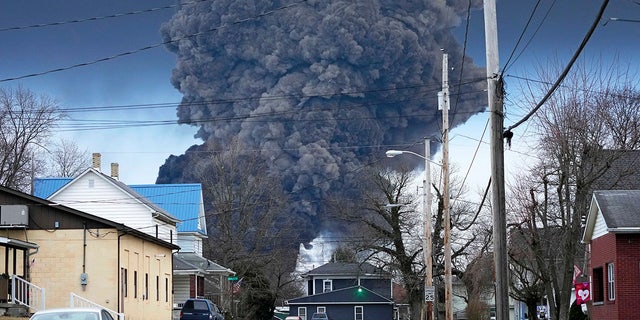How to tell if you’ve been affected by toxic chemical poisoning — and what to do about it
Fear and uncertainty have been swirling in East Palestine, Ohio and across the country in the wake of the Feb. 3 train derailment, which was followed by a chemical spill and a massive fire.
As images of toxic smoke plumes continue to circulate, many people are concerned about long-term effects.
Not all chemical spills result in the same signs and symptoms, said Dr. Kelly Johnson-Arbor, a medical toxicology physician and interim executive director at the National Capital Poison Center in Washington, D.C.
OHIO TRAIN DERAILMENT: OFFICIALS INSIST EAST PALESTINE IS SAFE BUT RESIDENTS AREN’T BUYING IT
“Some chemicals can cause direct toxicity, while others cause lung irritation or displace oxygen from the body,” she told Fox News Digital via email.
Not all chemical exposures result in immediate symptoms, she explained.
“Some poisonous chemicals, such as phosgene and nitrogen dioxide, do not cause immediate respiratory irritation or other symptoms, because they are not very water-soluble,” said Dr. Johnson-Arbor.
“People who are exposed to these chemicals are often advised to seek medical attention even if they initially feel fine, since serious symptoms can result hours or even a day or more after exposure,” she added.
‘FOREVER CHEMICALS’ IN WATER AND PACKAGING CAN RISK HEALTH, EPA SAYS
For other chemical exposures, she said people don’t necessarily need to seek medical attention if they don’t have symptoms, as this could overcrowd hospitals and make it harder for sick patients to get care.
While one might expect chemicals to smell harsh or pungent, that’s not always the case.
Some people might not be able to smell a particular chemical at all — and these chemicals may even have a pleasant scent.
“Some chemicals can cause direct toxicity, while others cause lung irritation or displace oxygen from the body.”
“Also, people can become accustomed to the smell over time — this is called ‘olfactory fatigue,’” said Johnson-Arbor.
For chemicals that do cause immediate signs and symptoms, people may experience burning and irritation of the eyes, nose and throat, as well as coughing and shortness of breath.
How far can toxic chemicals travel?
Many East Palestine residents have expressed their concern about exposure after the chemical spill — but what about those who live one, two or even three towns away?

“While being closer to the location of a spill may increase the chances of chemical exposure and adverse effects, geography and wind speed also play a role in the severity of an outdoor chemical exposure,” the doctor said.
EAST PALESTINE: HHS, CDC SENDING MEDICAL PERSONNEL AFTER TRAIN DERAILMENT
Some chemicals — including vinyl chloride — are heavier than air and stay closer to the ground, she said.
This means it’s smart to move to an elevated area, such as a hill, to help prevent exposure. If there are high winds, position yourself upwind.
On its website, FEMA recommends remaining at least half a mile (8-10 city blocks) away from a hazardous materials incident.
Quick action is important
If you think you’ve been exposed, the first move is to get as far from the site of the spill as possible.
If the spill happened outside, that’s mean hunkering down inside, closing all doors and windows, and turning off all ventilation systems.
In the event of an indoor spill, evacuate outside into the fresh air.
East Palestine residents are concerned about exposure — but what about those who live one, two or even three towns away?
Next comes decontamination, which Dr. Johnson-Arbor said can help remove chemicals from the eyes and skin.
“To undergo decontamination, undress and take a shower using room-temperature water for at least 10-15 minutes,” she said.
“If the chemical is in your eyes, allow the shower water to rinse your eyes. Children and pets exposed to chemicals can also undergo decontamination in this manner.”

Finally, the doctor said it’s important to contact Poison Control for expert advice.
People can dial Poison Control at 1-800-222-1222 or at poisoncontrol.org.
High-risk individuals should seek medical care
Although train derailments involving dangerous chemical spills are relatively rare, Dr. Johnson-Arbor said these incidents could have harmful effects on the environment, potentially poisoning the drinking water supply, plants and animals.
“Even low levels of toxic chemicals in the air can cause health problems for people who have underlying health conditions, such as asthma, COPD or heart disease,” she said.
It’s important for high-risk people to seek medical care if they show any signs or symptoms of exposure.
CLICK HERE TO SIGN UP FOR OUR HEALTH NEWSLETTER
Short-term exposure won’t necessarily have the same harmful health effects as long-term exposure, said the doctor.
Vinyl chloride, the chemical spilled in the Ohio derailment, has been linked to a higher risk of cancer after long periods of exposure.

A 2017 study by Kenneth A. Mundt of the Department of Health Sciences in Massachusetts evaluated cancer diagnoses among 9,951 men who worked at vinyl chloride plants over a 30-year period.
The study found that the risk of developing liver cancer was only higher among workers who were exposed to very high amounts of the chemical over long time periods.
“Short-term exposures to vinyl chloride do not cause cancer, but can cause irritating effects to the nose, eyes and throat, as well as shortness of breath, coughing and headache,” Dr. Johnson-Arbor told Fox News Digital.
Read the full article Here


